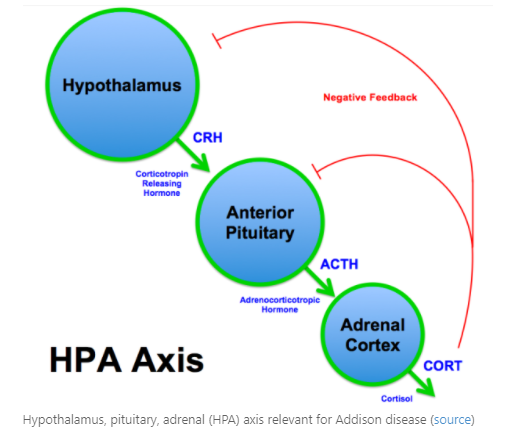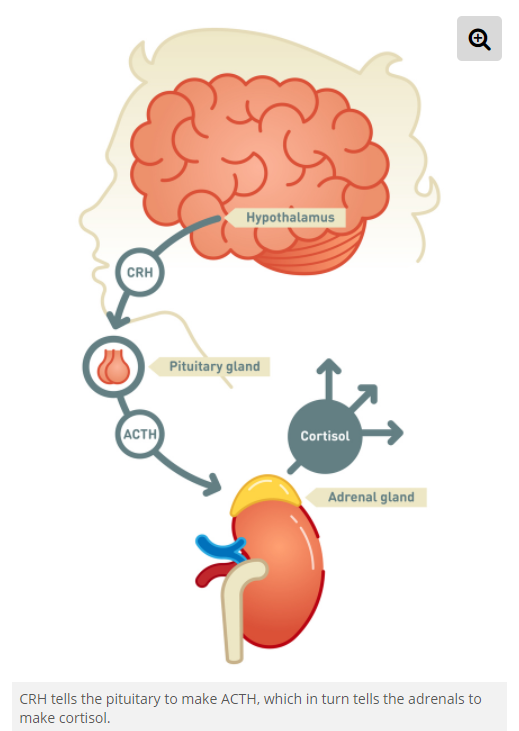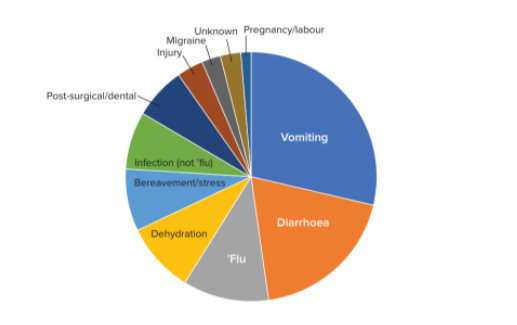During COVID lockdown there has been a national cessation on the delivery of intra-articular steroids, this has come at some cost to patients. Changes to their pain management strategy away from injection therapy to opiate based analgesia has come with its challenges. So why are steroid injection not recommended during a pandemic?

https://en.wikipedia.org/wiki/Hypothalamic%E2%80%93pituitary%E2%80%93adrenal_axis.
https://www.niddk.nih.gov/health-information/endocrine-diseases/adrenal-insufficiency-addisons-disease/definition-facts

The diagram shows how the HPA axis. If the adrenal gland is
suppressed or damaged it may not be able to make enough stress hormone cortisol
in turn effecting blood pressure, blood glucose, metabolism and inflammation. This
causes immune deficiency and puts the patient at comparatively greater risk when
exposed to gastroenteritis, viral infection, emotional stress or perhaps elective
surgery.
https://www.addisonsdisease.org.uk/newly-diagnosed-sick-day-rules

The short answer is that steroid injections are avoided during a pandemic because research has shown that they can lead to an adrenal crisis, this is defined as a blood cortisol <100 nmol (normal is 300 nmol). Although Addisons disease is rare (primary adrenal insufficiency) it is expected that secondary and tertiary adrenal insufficiency are more common and perhaps missed in the healthcare setting. We need to be more aware and prepare our patients during consent by arming them with a steroid alert card.
The delivery of intra-articular injections plays a role in the suppression of the HPA axis; Triamcinolone is ten times stronger than the naturally occurring glucocorticoid hormones and has a half life of 6 days and endures in the system for up to a month. During this period the negative feedback HPA axis will suppress the bodies natural secretion of cortisol by the adrenal gland, adrenocorticotropic hormone by the anterior pituitary gland, corticotropin releasing hormone by the Hypothalamus.
Once the steroid clearance has occurred, there is then a delay as the patients’ adrenals as they slowly begin coming back online, resulting in immune deficiency and subsequent illness.
So what can be done? The acute management for an adrenal crisis is 100mg intramuscular hydrocortisone injection, or perhaps a intravenous injection 200mg/24hr hydrocortisone. Fluids are needed there possible orally but can be IV Sodium chloride 0.9%. Follow the sick day rules.
The purpose of this website is to signpost MSK practitioners and patients to quality content via hyperlink.
The videos on these webpages are copyright of YouTube, this website does NOT claim any credit for the video content, and deliberately provides references below each video to compliment the authors.
This website is affiliated with Amazon, this provides you the peace of mind and security of buying quality products and maintaining your consumer rights.
MSK practitioners can recommend these products to patients, and by referring you, this site will receive a very small something in return from Amazon, this donation will help to keep this website afloat. Many thanks for your support.
The videos on this website are copyright of youtube, they are suitable for education and demonstration purposes, they are intended to assist your health professional in the provision of rehabilitation. It is recommended that you consult a health professional namely an MSK practitioner to gather instruction prior to using this site. Please do not self-diagnose or self-treat any health, medical, or physical condition. In using this site you agree to indemnify and hold harmless the website owners for any and all losses, injuries, or damages resulting from any and all claims that arise from your use or misuse of this website’s content. Use of this website is at your sole risk.
Copyright © 2025 Kingdom. Created by AA-Team. Powered by WooCommerce.
